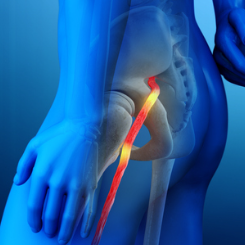Though each person experiences a different level of pain, sciatica is known for causing excruciating pain that begins in the lower back and shoots down one leg. If you suffer from sciatica, the experienced team at Restore Health can help with comprehensive pain management that includes physical therapy, interventional pain medicine, and regenerative medicine. If you need to get relief from sciatica, call the office in Spokane or Richland, Washington, or book an appointment online today.

Sciatica FAQ’s
You develop sciatica when you have a pinched sciatic nerve. The sciatic nerve leaves the spinal cord near the base of your spine and travels down both sides of your body, going through your buttocks and down each leg.
You may pinch the nerve following an injury, but sciatica most frequently develops due to spine conditions such as:
- Herniated disc
- Spinal stenosis
- Facet joint arthritis
- Degenerative disc disease
- Bone spurs
Though not as common, muscles in your buttocks can also pinch the nerve when they spasm. This condition, called piriformis syndrome, causes the same symptoms as sciatica.
The hallmark symptom of sciatica is pain that shoots down one of your legs. Though the severity of your pain may vary, most patients describe it as a severe, debilitating pain similar to an electric shock.
You may experience other symptoms that radiate along the nerve, including tingling, numbness, or burning pain. In severe cases, you may develop muscle weakness that makes it difficult to move your foot, bend your knee, or walk.
Many patients also find that their pain is worse when they sneeze, laugh, cough, bend backward, or have a bowel movement.
Many patients get the relief they need with treatments such as anti-inflammatory medications and physical therapy. If your pain doesn’t improve, the Restore Health team will work with you to determine potential advanced procedures that may benefit you and place the appropriate referral for you.
These are a few examples of pain treatments often used to relieve sciatica:
Lumbar epidural steroid injection
Injecting corticosteroids into the epidural space along the spinal cord allows the medication to flow around the damaged nerve, reducing inflammation and relieving your pain.
Radiofrequency ablation
Using a specialized probe, your provider treats the nerve with radiofrequency energy, creating a wound that blocks pain signals. Your pain significantly diminishes when the pain message doesn’t reach your brain.
Spinal cord stimulation
Spinal cord stimulation stops pain signals using mild electrical impulses delivered by tiny electrodes placed along your spinal cord.
Minimally invasive surgery
If your sciatica is caused by a herniated disc or spinal stenosis, the Restore Health team may recommend a minimally invasive procedure to repair the disc or decompress the nerve.
Regenerative medicine
When sciatica is due to a damaged disc, platelet-rich plasma or stem cell injections may help the disc heal, relieving pressure on the nerve.
